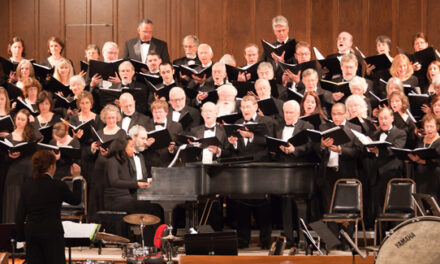“Welcome to JAM. Do you know what that is?” was the first question asked at “An Evening of Ellington.” “Jelly!” one member of the audience responded. Actually, in this case, JAM is Jazz Appreciation Month, which was kicked off in style at the Halle Cultural Arts Center. Lenore Raphael, a Steinway Artist renowned for her brilliant technique, formed a trio with bass player Rick Eckberg and Peter Ingram handling the rhythm. The program was entirely made up of Duke Ellington standards: some well known, and some a little more obscure.
Raphael sparkled most in “Take the ‘A’ Train” and “Don’t Get Around Much Anymore.” While her fingerwork was not as brilliant as anticipated, her harmonic palette demonstrated an impressive flexibility and creativity. Peter Ingram showed a decided flair in “Caravan” and “Perdido” — not composed by Ellington, but first recorded by his band in the US. Ingram’s expression of the exotic elements was not merely a bag of cheap tricks; his playing was both evocative and complex, which can be a hard balance to find. His almost pointillistic solo at the end of “Don’t Get Around” showcased his capacity for subtlety as well.
Rick Eckberg, to be honest, entirely stole the show with his spectacular playing. It’s common practice to call out some of the local boys to play with imported stars, but in this case, the local representatives more than held their own. Eckberg played tastefully, complementing his partners, but his energetic drive, inventive melodic improvisation, and clean technique really set his solos apart. While his bowing technique was less than stellar, much credit is due for his creativity in using it at all. His complete mastery over the more traditional jazz techniques showed both him and the rest of the trio to a wonderful advantage. “In a Sentimental Mood” demonstrated what Eckberg could do unaccompanied with a more lyrical ballad, and his flashy playing on the final tune, “It Don’t Mean a Thing” was equally impressive.
The venue itself was perfect for this sort of concert. The setting was intimate, but managed to project a wonderfully cheerful and energetic atmosphere. The lighting was simple, but effective, and the crowd enthusiastic. Unfortunately, the amplification of the trio left much to be desired. All sorts of unnecessary and unmusical sounds were picked up by the bass microphone, and the piano’s volume was uneven depending on the range. Granted, this reviewer is one of those who positively despise electronic amplification unless absolutely necessary; it seems a shame that the sound issues were so distracting, because it’s hard to believe that amplification was really needed in the first place in that performance space.
The trio displayed a touching confidence in small-town NC’s knowledge of Ellington standards. Most of the program was announced from the stage, but some of the tunes, such as “Satin Doll,” were assumed to be obvious. Informed or not, the audience was immensely pleased with the entire affair, especially with the final tune, “It Don’t Mean a Thing.” This number called for some audience participation with the “do-waps,” and everyone gave a good effort. Raphael, before her “good night”‘ smiled and said, “We had fun tonight, and we hope you did too.” The listeners couldn’t agree more.











